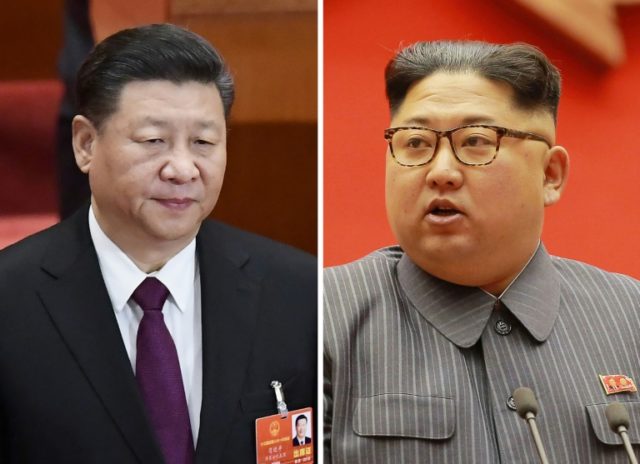South Korea’s Joongang Ilbo, citing “a source familiar” with China-North Korea relations, reported Wednesday that dictator Kim Jong-un requested Chinese economic investment in his country during his most recent summit with counterpart Xi Jinping.
The report is the latest in a string that appears to show concerted efforts by North Korean leaders to persuade foreign powers to pay for the reconstruction of their country, ravaged by over 60 years of strict communist leadership.
While China is run by the Communist Party, it allows foreign investment that benefits the regime, strictly regulating it to ensure that there is no free market, which could result in unintended beneficiaries Beijing cannot control.
According to North Korea’s state-run news agencies, Kim Jong-un told the leadership of his Workers’ Party in April that Pyongyang would shift its focus away from the development of nuclear weapons and “concentrate all efforts of the whole party and country on the socialist economic construction.” His remarks followed the imposition of unprecedented global sanctions on North Korea’s economy, possible after China signed the United Nations sanctions plan in response to Kim’s sixth nuclear test.
Joongang Ilbo‘s source notes that, while China is North Korea’s largest trading partner and closest ally, Kim has previously failed in enticing major Chinese infrastructure companies to invest in his country.
“Most of the Chinese companies that have invested in North Korea so far have been small and middle-sized and therefore faced difficulty in developing necessary infrastructure,” the source told the South Korean newspaper. “The topics of Pyongyang’s infrastructure, investment by large Chinese insurance firms and development of resource-rich mining centers such as Tanchon in North Korea’s South Hamgyong province are also under discussion following the second North Korea-China summit.”
The source specifically noted that Kim told Xi Jinping he wants to develop four special “economic zones”: Pyongyang, “the western port city of Nampo, Sinuiju on the northwestern border with China and Chongjin on the eastern coast.”
North Korea’s government imposes a strict caste system known as songbun, which prevents families of those considered counter-revolutionaries from traveling freely. Those considered the most dangerous – Christians and members of families who opposed communism during the rise of “Eternal President” Kim Il-sung – may live their entire lives trapped in labor camps. Only those with high songbun can enter Pyongyang. The restriction of economic growth to special “zones” fits Kim’s limitations on allowing unconnected families to leave impoverished areas.
At least two of these special economic zones were chosen to be very close to the Chinese border, where China has forced some companies to stop investing in North Korea to comply with sanctions. Beijing has loudly protested that the sanctions have hurt the Chinese economy, and so may be eager to develop new revenue streams as Kim reportedly requested.
“Owing to China’s traditional economic ties with North Korea, it will mainly be China paying the price for implementing the resolution,” Chinese Foreign Minister Wang Yi said in August, shortly after a new round of sanctions on North Korean goods. “But in order to protect the international non-proliferation system and regional peace and stability, China will, as before, fully and strictly properly implement the entire contents of the relevant resolution.”
By October, reports showed that China had actually increased exports to North Korea amid sanctions.
Following Kim’s trip to Dalian, the second to China in as many months, North Korea deployed a delegation of mayors and local party officials to Beijing to reportedly observe the “socialist economic system.” The purpose of the trip, reports suggested, was for North Koreans to learn how China maintains full control over its society while also benefitting from international trade.
China is not the only country Kim is pressuring to invest in North Korea.
“He made clear it was important to him that when that time came, when those objectives had been achieved, he in turn would receive economic help from America in the form of private sector business’s knowledge and know-how,” Secretary of State Mike Pompeo said of the communist dictator, shortly after his return from Pyongyang in May. South Korean Unification Minister Cho Myung-gyun similarly stated that North Korea was interested in attracting investment as part of the process of “denuclearization,” a word whose definition remains inconsistent among North Korean officials and the free world.
This week, South Korea’s Dong-A Ilbo newspaper reported that North Korea has requested the United States “support” the construction of a “world-class resort” in Wonsan, a port city where Kim forced journalists covering the alleged shutdown of the nation’s nuclear test site to stay. Some reports suggested that promoting tourism in Wonsan was a prerequisite for journalists to be allowed to document the explosions at Punggye-ri, which allegedly destroyed all useable nuclear testing tunnels. No nuclear experts attended the shutdown, as the government banned them from the area, so no one has been able to confirm that the explosions did what Pyongyang claims.
Reconstructing the devastated North Korean economy will cost somewhere between $2 and $5 trillion, according to various economic studies.

COMMENTS
Please let us know if you're having issues with commenting.